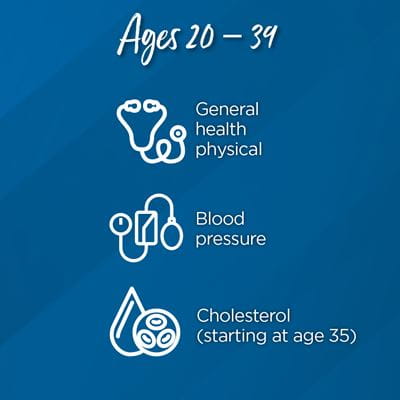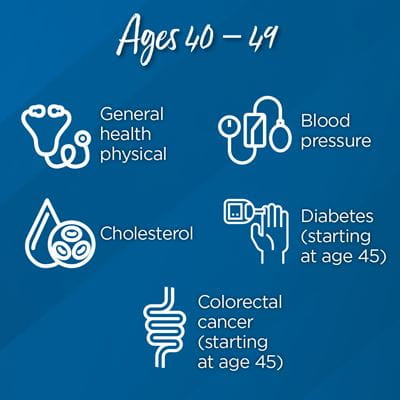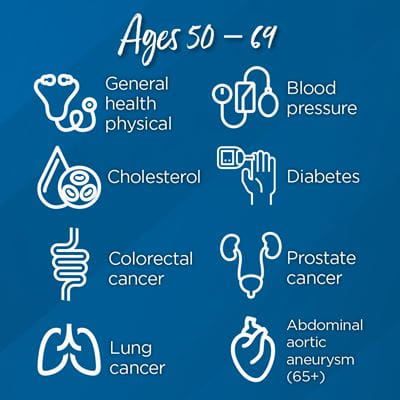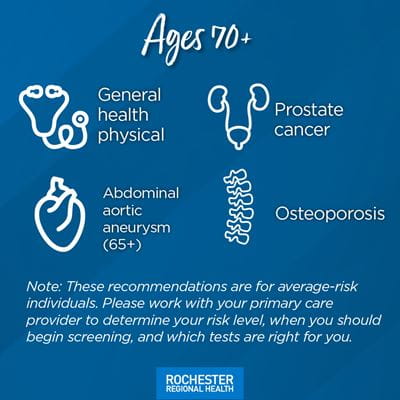
June is Men’s Health Month – an excellent time to be proactive in maintaining your personal health and well-being.
Depending on your age, you may be at a higher risk for certain health conditions, ranging from high blood pressure to heart disease. Keeping up with routine screenings is an important part of maintaining a healthy lifestyle.




An annual physical is a good habit to maintain at every age. During this visit, your primary care provider will check your overall health – taking your blood pressure, heart rate, and measuring your height and weight. You may be asked to visit a lab in advance to obtain some bloodwork so your provider can review your cholesterol, blood sugar, and other important blood levels.
Your provider will also ask a series of questions about your overall lifestyle and family health history, whether you might be depressed or experiencing abuse, and listen to any questions you might have. Based on the results of the visit, you may be referred to other providers.
Even if you feel healthy, a regular checkup with your provider is a good way to confirm your health or identify a problem in its early stages.
Frequency: Once a year, beginning at age 20
The U.S. Preventive Services Task Force recommends that men between the ages of 65 and 75 who have smoked more than 100 cigarettes in their lifetime receive a one-time abdominal aortic aneurysm screening ultrasound.
This test uses ultrasonography to screen for swelling in the aorta, the main blood vessel that runs from the heart down through the torso. Individuals who have smoked are at a higher risk for an abdominal aortic aneurysm compared to non-smokers. A ruptured abdominal aortic aneurysm can cause life-threatening bleeding.
Frequency: Once, between the ages of 65 and 75
Many health conditions are linked to high blood pressure, including heart disease, diabetes, and stroke. The first step toward maintaining a healthy blood pressure is having it checked by a healthcare provider. This can be done at your annual general health physical.
Your provider will determine a healthy blood pressure for you to maintain depending on your age, medical history, and general health.
Frequency: At least once every 2 years, beginning at age 20
Some transgender men should undergo an annual mammogram to screen for breast cancer.
Frequency: Once a year, beginning at age 40
Some transgender men may need a Pap test to screen for cervical cancer. Pap smears are done in a doctor’s office and are used to collect a sample from a patient’s cervix. The sample is sent to the lab for testing. HPV testing may also be recommended. HPV is the virus that causes most cervical cancers.
Frequency: Every one to three years, beginning at age 21
Similar to high blood pressure, high cholesterol can pose serious risks to your health.
There are two main types of cholesterol - low-density lipoprotein (LDL) or “bad” cholesterol, and high-density lipoprotein (HDL) or “good” cholesterol. Too much LDL cholesterol can block your arteries and increase your risk for heart disease and stroke.
Your cholesterol levels are measured in a basic blood panel obtained during a blood draw at a lab. Cholesterol levels can be checked at your annual general health physical.
Frequency: At least once every 5 years, beginning at age 35
Screenings for colorectal cancer are recommended to begin at age 45. The process is designed to detect pre-cancerous polyps (small growths on the inner lining of the colon or rectum) and early-stage colorectal cancer before they become symptomatic, and are easier to treat.
Based on your overall health and risk level, there are a variety of tests that can be performed.
Frequency: Every 1 – 10 years (depending on the type of test), beginning at age 45
Diabetes can increase your risk of developing many serious health conditions, including heart disease, blindness, and kidney failure. If you're older than 45, have a body mass index above 25, or have high blood pressure or cholesterol, the American Diabetes Association recommends you be screened for diabetes. Symptoms of pre-diabetes and Type 2 diabetes often happen slowly and may not be noticeable, so monitoring your blood sugar levels is important.
Frequency: At least once every 3 years, beginning at age 45
For individuals between the ages of 50 and 80, who currently smoke or have quit within the last 15 years, and have a 20-pack-year smoking history, the U.S. Preventive Services Task Force strongly encourages an annual lung cancer screening.
A low-dose chest CT scan is quick, painless and non-invasive – and is currently the best way to screen for lung cancer.
Frequency: Once a year, beginning at age 50 (depending on eligibility)
As you grow older, your bone density can become a cause for concern. Brittle bones can break more easily, raising the risk of severe health problems after a fall. Healthcare providers recommend a bone density scan, which is usually done in the form of a specialized x-ray unit.
Frequency: Once every two years, beginning at age 70
At age 45, men are encouraged to speak with their primary care provider about whether to obtain a baseline prostate specific antigen (PSA) blood test. This test measures a specific protein in the blood that is released by the prostate. PSA is often elevated when a person has prostate cancer. Beginning at age 50, men are encouraged to talk to their healthcare provider about annual PSA tests and digital rectal exams.
Frequency: Consult with your primary care provider, beginning at age 45
Perform monthly self-exams to check for testicular masses. Finding anything unusual requires a visit to your primary care provider or urologist.
All of these recommendations are based on average-risk patients. Talk with your primary care provider to determine your risk level, when you should begin screening, and which tests are right for you.